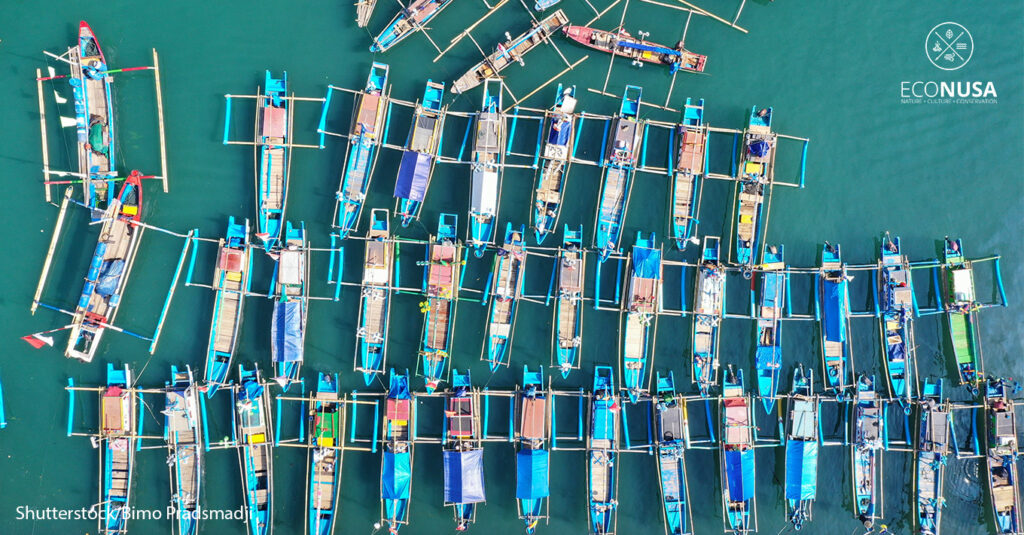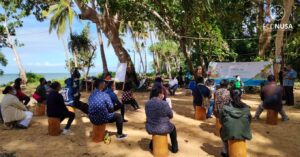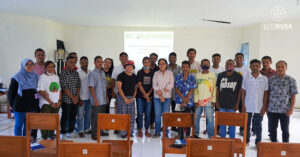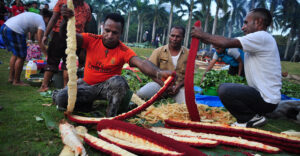
The government’s plan to issue a measured fishing policy brings about query and hesitation related to the commitment for improvement of catch fisheries governance. The new policy arrangement which is based on the state revenue consideration might destroy fisheries ecosystem and overlook the fishers welfare.
“The fishers will be more marginalized when the policy draft is manifested. They should also face other threats such as climate change that make them hard to work on the sea,” said Dedi S. Adhuri, a researcher of the National Innovation and Research Agency (BRIN)’s Community and Culture Research Center, on a virtual discussion entitled “Considering Marine and Fisheries Policy Trend 2022” on 23 February 2022.
Marine Affairs and Fisheries Ministry (MoMAF) designated the rise of Non-Tax State Revenue (NTSR) as one of the priorities up to 2024. Based on the fishery permit, the government earned around Rp600 billion PNBP. However, the revenue is not deemed going in line with the fisheries potential in Indonesia. For the reason, by freeing permit, the government is expected to generate Rp12 trillion from the catches of fishery resources.
Read More: Waimon Community Dreams to Manage Shrimp in Bambu Island
The regulation to boost up the NTSR is mandated by the Draft of Government Regulation on Measured Fishing Policy and Draft of Marine Affairs and Fisheries Minister Regulation on the Withdrawing Procedure of Non-Tax State Revenue from the Utilization of Fishery Resource under Contract System (MoMAF Minister Regulation on Contract System). Unfortunately, the policies here fail to count the balance water ecosystem and fishers lives.
Dedi said that the draft of Measured Fishing Policy only put the clause on fish potential on the measured fishing zone. He criticized the absence of regulation on the overfishing located at the red zone. Based on the Ministerial Regulation No.50/KEPMEN-KP/2017, squid, lobster, and shrimp are on the red zone at nearly all Fisheries Management Areas (WPP).
As to Dedi, the distribution of WPP zone into three categories of industry zone, traditional fisher zone, and restricted fishery zone, will make the fishing zone overlapping. It is because every WPP has different actors of industry and fisher. “How would govern the overlapping reality here? Then, in the industrial zone with the designated quota, what would happen to the over quota species?” stated Dedi.
Read More: Young People, Key to Environmental Success in Namatota
Dedi also has other worries on the imbalance relation among fishers and fishing industry. In the Article 14 or the Measured Fishing Policy draft, Item 1 states that fishing on the fishing industry zone obliged the employment of Indonesian citizen ship captain and crews. Then in Item 2, it mentions that the ship crew should prioritize the local fishers who administratively reside in the province of fishing industry zone.
“Fishers could be trained as the ship crews through vocational school provided by the MoMAF. The plan here shows an intention to make fishers subordinate that have so far been independent to become ship crews. There are no preparation and organization of fishers and cooperative that should be anticipated by the MoMAF,” added Dedi.
General Secretary of Public Coalition for Fisheries Justice (Kiara), Susan Herawati, said that the partnership scheme offered by the government here sides with the private and foreign sectors and this is deemed a back step of sea sovereignty in Indonesia. As to her, the combat against illegal, unreported, unregulated fishing (IUU Fishing) will be to no avail.
Read More: Quit Bombing Fish
Partnership under a contract system is mandated by the Measured Fishing Policy draft. In Article 8 Item 1, it is stated that the use of industry quota in the fishing industry zone is done by cooperation contract system and business permit. Based on the MoMAF Minister Regulation on Contract System, the contract duration lasts for 20 years at the longest with possible extension.
“11 WPPs might be contracted to foreign corporation by using foreign investment scheme. When we fight for Indonesian sea from foreign ships exploitation, the exploitation could happen today with the Job Creation Law. The movement moves backward from our mandate as the maritime country,” said Susan.
As to Susan, the contract mechanism on the utilization of fisheries potentials will potentially spark a graft case as it ever happened to the MoMAF in the former period. The former Minister Edhy Prabowo was sentenced to five years imprisonment due to bribery from baby lobster export permit.
Read More: Only Few Aware of Climate Crisis Despite Looming Threat
Rejection against the Measured Fishing Policy draft is also addressed by the Coalition for Sustainable Marine Affairs and Fisheries (Koral). Based on some research publications, the quota system of the measured fisheries have more adverse impact such as distancing fishers away from fishery resources, ecology destruction, and triggering the rise of greenhouse gas.
“The policy here does not guarantee the sustainability of marine and fishery resources which also serve as the sustainable development goal (SDGs),” said Suhana from Pandu Laut Nusantara who represents Koral.
Editor: Leo Wahyudi








